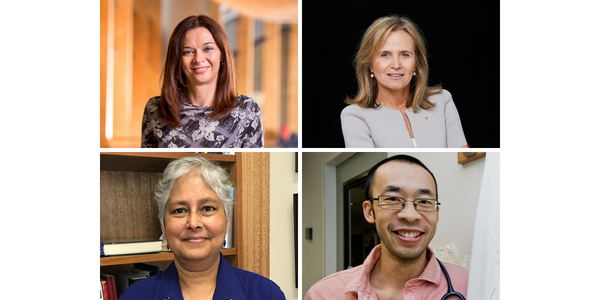02 Sep 2022
$8.9m in Medical Research Future Funds grants for Doherty Institute researchers
Doherty Institute researchers secured a combined $8.9 million in grants from the Australian Government Medical Research Future Fund (MRFF) in the latest competitive round for COVID-19 Treatment Access and Public Health Activity.
The funding will enable researchers to continue their important work in infectious diseases and immunology research, specifically in light of the coronavirus response.
University of Melbourne Professor Sharon Lewin, Director of the Doherty Institute congratulated the recipients.
“It is encouraging to see the breadth of innovative research projects funded through these MRFF grants,” Professor Lewin said.
“The COVID-19 pandemic has made clear the importance of funding scientific research in the areas of infectious diseases and immunology, and it’s great to see the Australian Government Medical Research Future Fund supporting this research.”
Professor Lewin also noted that many excellent research projects missed out in the highly competitive grant environment.
“It’s disappointing for those researchers who have not been successful in this round, despite putting forward excellent projects,” Professor Lewin said.
The Australian Government MRFF aims to transform health and medical research and innovation to improve lives, build the economy and contribute to health system sustainability.
Below are details of the grants linked to Doherty Institute research teams:

Professor Katherine Kedzierska – MRFF grant: $3,001,424
Understanding and defining the immune system responses to emerging SARS-CoV-2 variants of concern
University of Melbourne Professor Katherine Kedzierska, Head of the Human T cell Laboratory at the Doherty Institute, and her co-investigators received $3 million for a project that aims to understand and define the immune system responses to emerging SARS-CoV-2 variants of concern, to inform potential therapy and vaccine programs to limit disease spread and protect at-risk groups.
“It is a privilege to receive this MRFF grant supporting one of Australia’s most advanced COVID-19 immunology program,” Professor Kedzierska said.
“We urgently need to understand the immune responses to emerging SARS-CoV-2 variants across a range of age groups and among vulnerable communities, to inform and support our pandemic response. Our project team of internationally recognised immunologists, virologists and infectious disease physicians will work to achieve the goals of our MRFF.
“I thank my co-investigators and colleagues who read and reviewed my application and encourage future applicants to seek all the critical input you can.”
Professor Sharon Lewin – MRFF grant: $1,000,000
Developing mRNA-based therapeutics for SARS-CoV2
University of Melbourne Professor Sharon Lewin, Director of the Doherty Institute received $1 million toward a project which aims to develop mRNA-based therapeutics for SARS-CoV2.
“This MRFF grant will support our team’s collaborative studies on the use of CRISPR-Cas13 as a therapeutic for SARS-CoV2. We recently demonstrated that CRISPR-Cas13 can act as gene scissors to destroy viral RNA using a test tube model, but delivery in vivo is now our biggest challenge to create a viable therapeutic,” Professor Lewin explained.
“This project will build on our collaborative program with Dr Mohamed Fareh and Professor Joe Trapani at the Peter Macallum Cancer Centre, Colin Pouton at Monash Institute for Pharmaceutical Sciences and other colleagues across the Doherty and University of Melbourne to deliver CRISPR-Cas13 directly to nasal mucosa using mRNA wrapped in lipid nanoparticles, to treat and prevent COVID-19.”
Professor Kanta Subbarao – MRFF grant: $998,339
Analysing how respiratory viruses are transmitted through air, to improve future outbreak response
University of Melbourne Professor Kanta Subbarao, Director of the WHO Collaborating Centre for Reference and Research on Influenza at the Doherty Institute, received $998,339 toward a research project analysing how respiratory viruses are transmitted through air, to improve models of transmission and responses to future outbreaks.
“The COVID-19 pandemic has highlighted the importance of understanding airborne transmission of SARS-CoV-2 and other respiratory viruses,” Professor Subbarao said.
“Our multidisciplinary team includes leading experts in infectious disease modelling, epidemiology, aerosol science, engineering, virology and animal models for airborne transmission of viruses, infectious diseases medicine, respiratory medicine and assessment of mitigation measures – all tackling this complex issue.”
Professor Steven Tong – MRFF joint grant with Monash University: $3,997,914
A coordinated multiplatform randomised trial for hospitalised patients with COVID-19
University of Melbourne Professor Steven Tong, an infectious diseases physician with the Victorian Infectious Diseases Service (VIDS), Royal Melbourne Hospital at the Doherty Institute, leads the Australasian COVID-19 Trial (ASCOT) – a randomised control trial that tests treatments for hospitalised COVID-19 patients.
In a joint proposal with Monash University led by Professor Steve Webb, the project team has received $3,997,914 to coordinate the integration of ASCOT with another adaptive platform trial - the Randomised, Embedded, Multi-factorial, Adaptive Platform Trial for Community-Acquired Pneumonia (REMAP-CAP). ASCOT focusses on non-critically ill patients and REMAP-CAP on patients in the intensive care unit. Together, the two trials will evaluate how to optimise antivirals, immune modulators, steroids and convalescent plasma for hospitalised patients.
“This is an exciting development that means ASCOT will generate results that contribute to global datasets in real-time,” Professor Tong said.
“REMAP-CAP is a highly successful platform with global reach. Within this joint framework, ASCOT will provide leadership on addressing priority therapeutic questions for non-critically ill patients.”


